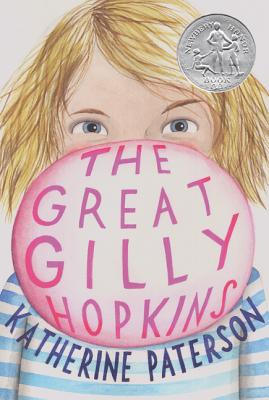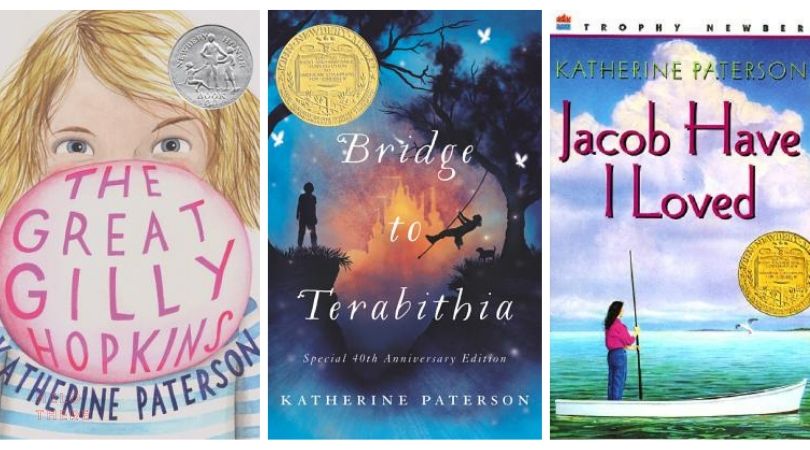craft review by Anne-Marie Strohman
In the last two posts in this series, on Bridge to Terabithia and on Jacob Have I Loved, we’ve seen how Katherine Paterson creates inevitable and surprising endings, in both a conventional ending (Bridge) and an unconventional one (Jacob). In both cases, the character’s emotional arc concludes, and the character’s change is confirmed in the final scene.
But Paterson always adds some extra sauce–a new and surprising emotion, an empathetic connection, a recreation of an earlier scene–to surprise the reader and create a satisfying ending. She does the same in her 1978 middle grade novel The Great Gilly Hopkins.
The Great Gilly Hopkins
The Great Gilly Hopkins begins on the first day of Gilly Hopkins’ new foster placement at Thompson Park. She is determined to make her foster mother’s life miserable and to challenge and butt up against every kindness.

Gilly is a terror throughout most of the book. She starts out wanting to get away from Thompson Park and have her birth mother come whisk her away to a grand life. We see her longing for love in the way she idealizes her birth mother and takes extra special care of the photo she has of her. She takes concrete action to get what she wants, sending a much-exaggerated letter about her horrible foster home and stealing money to take a bus to California.
But what Gilly really needs is to love and be loved. She gets this love and care from the gruff foster mother Trotter, the kindly neighbor Mr. Randolph, her patient teacher, and her little foster brother. At the end, she even expressly recognizes that she has found a home at Thompson Park. But it is too late. Gilly’s birth mother has written her own mother to go and get Gilly, and Gilly is legally obligated to go.
Closing the Emotional Arc
The first surprising thing about the ending is Gilly’s admission of how her desires have changed. In a desperate phone call to Trotter from the airport, she says,
“I’m coming home. . . . I want to come home. . . . I want to be with you and William Ernest and Mr. Randolph. . . . Trotter . . . I love you.” (208-209)
This straightforward acknowledgment of a met need shows readers that Gilly has indeed changed. But we have seen earlier how she behaves with her grandmother, how she writes to William Ernest as she promised, how she admits that she lies a lot. This final statement of her met need is part of the surprising ending. We don’t expect Gilly to be so straightforward in admitting her growth.
The Surprise of Not Getting What She Wants OR What She Needs
What is most surprising, however, is Gilly’s acceptance that she can’t go back to Thompson Park. “‘Your grandma is home,’” as Trotter tells her (208). The story ends with Gilly deciding that she can’t leave her grandmother all alone. Paterson ends the story quickly:
She put the phone gently on the hook. . . . By the time she got back to . . . Nonnie, she had herself well under control. “Sorry to make you wait,” Gilly said, “I’m ready to go home now.” No clouds of glory, perhaps, but Trotter would be proud. (209)
The ending we as readers want is for Gilly to go back to Thompson Park and live a life where she is accepted as she is. As Trotter tells her on the phone, “Me and William Ernest and Mr. Randolph kinda like you the way you are” (209). But as Paterson said in an interview, the ending is inevitable: “I knew, sadly, that Gilly could not go back to Thompson Park. She must move on and share what she had learned there from Trotter, W.E., Mr. Randolph, Miss Harris [her teacher] and even from Agnes [a school friend]. The book is sort of a journey from anger and selfishness to love and compassion.”
The Surprising Emotional Shift
What was surprising to me about Gilly’s ending is the emotional shift. We have such hope for Gilly—She is loved! She loves! She has found a home!—but our hopes for her are dashed when we realize she can’t go back. However, Gilly’s choice to stay with her grandmother underscores her maturation. She can decide to have compassion for her grandmother because Trotter and others have had compassion for her. She can go into a less-ideal living situation because she knows what it means to have a home. It is the disappointing ending itself that shows Gilly’s change.
Paterson is careful, though, to keep Gilly who she is. On the phone with Trotter she cusses at her, and says, “Don’t try to make a stinking Christian out of me,” and “Go to hell, Trotter” (209). Paterson lets readers know that Gilly is still Gilly, even though she has matured in the most important ways.
As writers, we can look to The Great Gilly Hopkins for how to handle an inevitable emotional shift that’s the opposite of what readers want for the character. The inevitability must be the piece that shows the character’s maturity, but there must be other elements in the scene that show the character as the same character we’ve come to know and love, no matter how rough around the edges.
What We Can Learn from Paterson’s Endings
All of these story endings show the protagonists executing what they’ve learned. Jess shares the magic of Terabithia with May Belle showing that he has grown in love and acceptance. Louise is able to give all her attention to the sickly twin she helped birth, experiencing the reactions of the adults at her birth, and also to give the strong twin the love and support he needs, enacting the acceptance and understanding she now has for Caroline and herself. Gilly gives up what she needs and in doing so shows that she has matured in empathy. Paterson’s endings all complete a strong character arc and lead readers to an emotionally satisfying ending.
Her surprises challenge writers to look far afield for ways to end a story. One might provide a tonal shift from grief to hope, as she does in Bridge to Terabithia. Or one might have the protagonist reenact an earlier scene, as in Bridge to Terabithia and Jacob Have I Loved. One might explore the passage of time and aging, as in Jacob Have I Loved. Or one might let the protagonist prove her maturity by giving up a happy ending, as Gilly does.
But the specific choices Paterson makes can do more than offer options to emulate. They can provide a template—inevitable and surprising—that encourages writers to use their imaginations, to not be afraid of complexity, and to be willing to let our endings surprise us.
Actions:
- Use your imagination!
- Try a complex ending.
- Brainstorm a list of ten possible endings for your story. Then brainstorm ten more. Find one that’s inevitable and surprising and give it a try.
Anne-Marie Strohman (co-editor) writes picture books, middle grade novels, and young adult short stories and novels. She is trained as a teacher, an editor, and a scholar, specializing in Renaissance Literature. She holds an MFA in Writing for Children and Young Adults from Vermont College of Fine Arts and is an active member of SCBWI. Find her at amstrohman.com and on Twitter @amstrwriter.

COMMENTs:
0